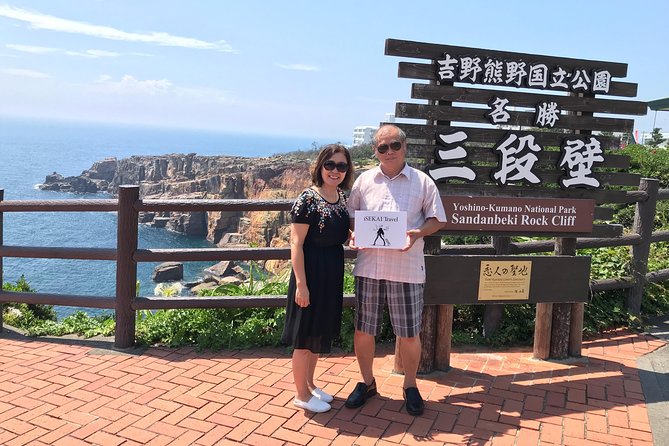Nestled in the heart of Tokyo like a time capsule, Asakusa beckons visitors to embark on a 1400-year history exploration. This enchanting district, with its ancient Sensoji Temple and bustling market streets, is a window into Japan’s vibrant cultural heritage.
In this article, readers will be taken on a captivating journey through Asakusa’s past and present, seeing its traditions and modern trends. From the humble origins of Sensoji Temple, built by two fishermen brothers, to the tantalizing array of traditional snacks in Nakamise-dori, every aspect of Asakusa’s history and culture is unveiled.
Accompanied by knowledgeable English-speaking guides, visitors will discover the district’s landmarks and receive insider recommendations for dining, drinking, and shopping in the Rokku district.
This article give you valuable insights and travel tips for an unforgettable exploration of Asakusa’s 1400-year history.
Great News! You can reserve your spot for free with Viator. You can easliy cancel any time up to 1 day before without paying anything.
Quick Takeaways
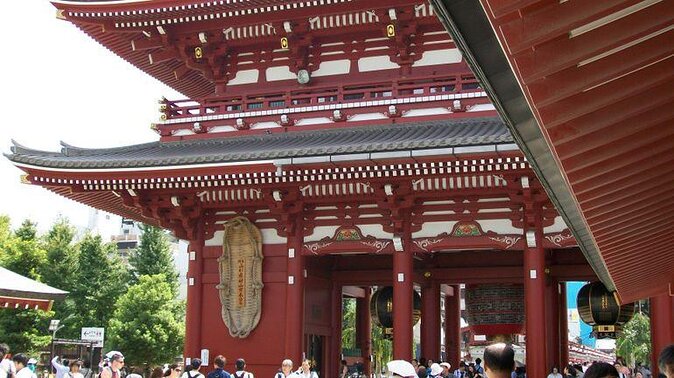
- Asakusa is a historic township in Tokyo with a 1,400-year-old Sensoji Temple as one of its popular landmarks.
- The temple was founded by two fisherman brothers and has been destroyed and rebuilt multiple times throughout history.
- Visitors can explore the market street of Nakamise-dori and taste traditional Japanese snacks.
- The Rokku district in Asakusa offers recommendations for dining, drinking, and shopping.
Not for you? Here's a few more great tours and experiences nearby.
Overview and Itinerary
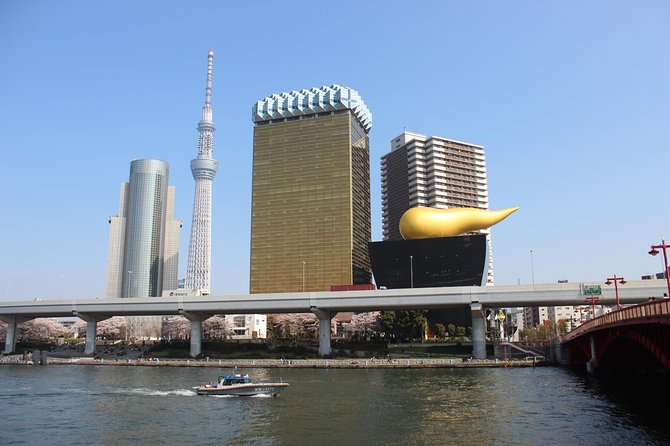
An indefinite pronoun is used to refer to a nonspecific person or thing.
The half-day walking tour of Asakusa provides visitors with a comprehensive exploration of this historic township in Tokyo. With its cultural significance and architectural highlights, the tour takes guests on a journey through time.
One of the main highlights is the 1,400-year-old Sensoji Temple, the oldest temple in Tokyo. Its historical background and repeated destruction throughout history make it a fascinating landmark to visit.
Plus, the tour includes a visit to the market street of Nakamise-dori, where visitors can enjoy the vibrant atmosphere and taste traditional Japanese snacks.
The tour also explores the Rokku district, offering recommendations for dining, drinking, and shopping.
You can also read our reviews of more tours and experiences in Tokyo.
Inclusions and Logistics
The tour of Asakusa includes several inclusions and logistics to ensure a seamless and enjoyable experience for visitors. Here are some key details to know:
- Transportation options:
- The meeting point is Asakusa Station, Exit 4 on the Ginza line. The address is 1-chōme-1-3 Asakusa, Taito City, Tokyo 111-0032, Japan.
- Hotel pickup and drop-off are provided for added convenience.
- Meeting point instructions:
- The tour starts at 01:30 PM and ends back at the meeting point.
- Last-minute bookings are accepted until two hours prior to the tour start time.
- For cancellations, a full refund is available if made up to 24 hours in advance. No refund is given for cancellations made less than 24 hours before the start time, and changes made less than 24 hours before the start time aren’t accepted.
With these logistics in place, visitors can focus on seeing the rich history and vibrant culture of Asakusa without any worries or hassle.
Traveler Tips and Reviews
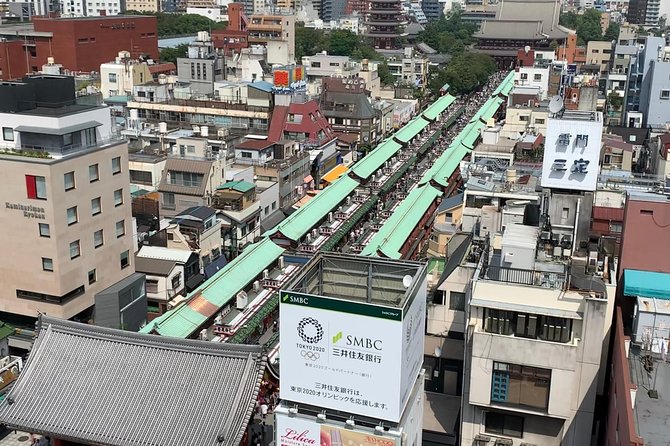
Visitors to Asakusa can benefit from the insights and experiences shared by previous travelers, as they provide valuable tips and reviews for a memorable exploration of this historic Tokyo township.
Before embarking on their journey, it’s recommended that travelers perform authenticity checks on the reviews to ensure accurate information.
One popular landmark that comes highly recommended is the 1,400-year-old Sensoji Temple, the oldest temple in Tokyo. Travelers praise the knowledgeable and attentive guides who offer a thorough overview of Asakusa’s history, as well as their fluency in English. They also appreciate the opportunity to try Japanese street food and explore the vibrant markets.
However, some negative reviews mention that the area can get busy and crowded, particularly on weekends.
Despite this, the overall consensus is that a visit to Asakusa is a fun and informative experience that’s highly recommended for those interested in Japanese history, street food, and markets.
Highlights of Asakusa
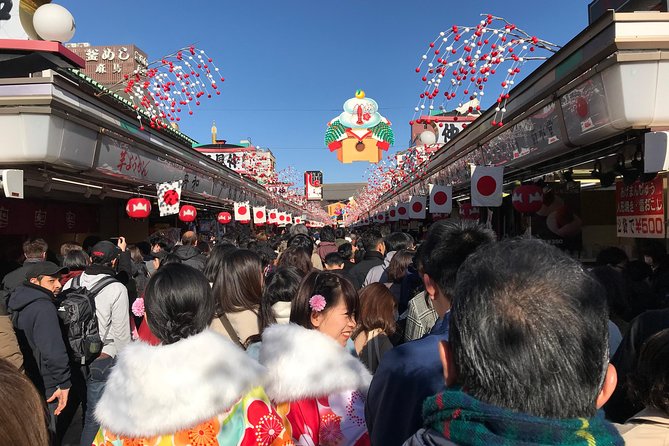
One of the highlights of Asakusa is the 1,400-year-old Senso-ji Temple, the oldest temple in Tokyo. This iconic landmark has a fascinating history, having been repeatedly destroyed and rebuilt throughout the centuries. Today, it stands as a testament to the unique blend of old traditions and modern trends found in Asakusa.
In front of the temple, there’s a lively strip of shops where visitors can find great presents and mementos to take home. Plus, the area is filled with street vendors offering interesting and delicious traditional snacks.
Another must-visit area in Asakusa is the Rokku district, where visitors can find numerous recommendations for dining, drinking, and shopping.
Positive Feedback on Guides and Recommendations
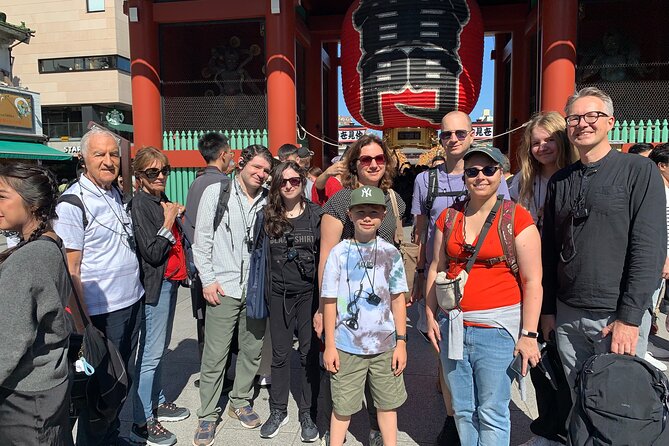
When it comes to positive feedback on guides and recommendations for exploring Asakusa, travelers have praised their knowledgeable and informative nature. These guides have been commended for offering a thorough exploration of Japanese history, showcasing treats typically served at temples, and being patient and friendly with all questions.
Visitors have also noted that the guides are fluent in English, which enhances the overall experience. This positive feedback highlights the guides’ expertise and their ability to provide a pleasant and educational tour. It’s clear that these guides play a crucial role in ensuring that visitors have a memorable and enriching experience in Asakusa.
Their knowledge and insights contribute to the visitors’ understanding and appreciation of the rich history, food, and markets in this historic township.
- Things To Do In Tokyo In November
- Things To Do In Tokyo In March 2024: Tokyo’s Best March Events
- Things To Do In April In Tokyo 2024: Tokyo’s Best April Events
- Things To Do In Tokyo In December 2023: Tokyo’s Best December Events
- Tokyo’s Weather And Seasons: A Guide For The Perfect Visit
- Tokyo Midtown Cherry Blossom Season
Senso-ji Temple
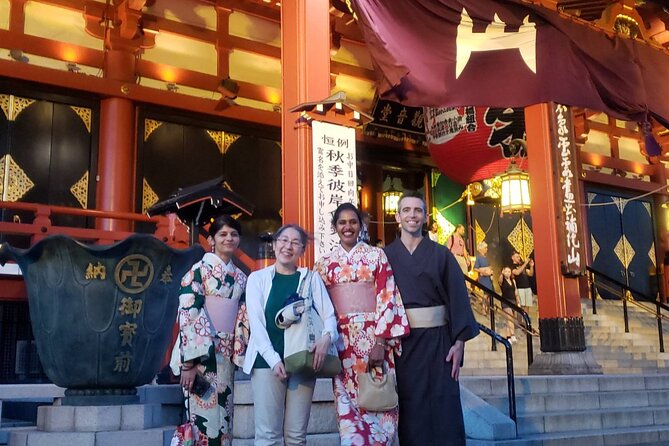
The Senso-ji Temple, a historic and revered site in Asakusa, stands as the oldest temple in Tokyo. With a rich history dating back 1400 years, this temple has witnessed destruction and rebuilding throughout the ages.
The unique architecture of the temple showcases a blend of old traditions and modern trends, making it a captivating sight for visitors.
As you approach the temple, you’ll be greeted by a vibrant strip of shops, offering a variety of presents and mementos. The bustling street vendors also provide the opportunity to taste interesting and traditional Japanese foods.
Whether you’re interested in the history or the architecture, the Senso-ji Temple is a must-visit destination in Asakusa.
Unique Culture in Asakusa
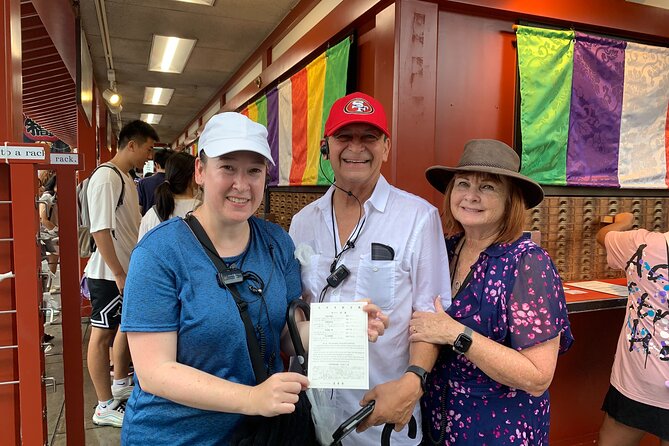
Asakusa’s unique culture is characterized by its blend of old traditions and modern trends, which can be seen throughout the bustling streets and vibrant shops surrounding the historic Senso-ji Temple. This fusion of the past and present creates a captivating atmosphere that attracts both locals and travelers alike. Asakusa is known for its traditional festivals, such as the Sanja Matsuri, where participants parade through the streets in colorful costumes and carry portable shrines. These festivals showcase the rich cultural heritage of the area and provide a glimpse into ancient traditions that are still celebrated today. Along With its traditional festivals, Asakusa also offers modern attractions that cater to contemporary tastes. Visitors can explore the trendy boutiques, hip cafes, and stylish bars that have emerged in recent years, adding a touch of modernity to the historic neighborhood. Whether you’re interested in experiencing Asakusa’s traditional festivals or exploring its modern attractions, the unique culture of this vibrant district is sure to leave a lasting impression.
| Traditional Festivals | Modern Attractions |
|---|---|
| Sanja Matsuri | Trendy boutiques |
| Kappabashi Street | Hip cafes |
| Sumida Park Fireworks | Stylish bars |
| Asakusa Samba Carnival | Contemporary art |
Street Vendors and Shopping
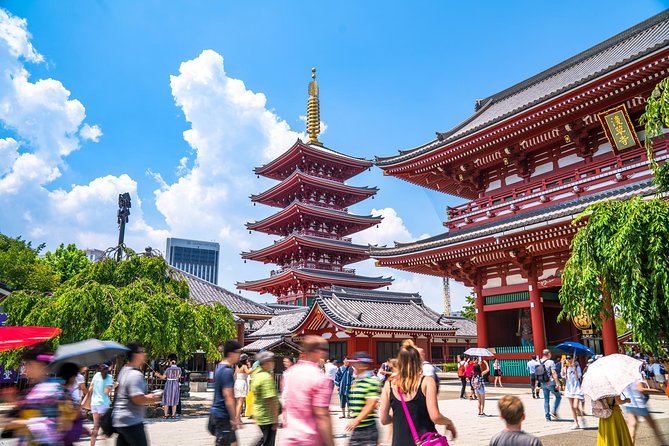
Street vendors and shopping in Asakusa offer a diverse array of unique products and culinary delights. Visitors can enjoy the bustling atmosphere of Nakamise-dori, a lively market street filled with traditional souvenirs and delectable treats. Here is a snapshot of what to expect:
- Traditional Souvenirs:
- Colorful kimono and yukata robes, perfect for capturing the essence of Japanese culture.
- Intricately crafted ceramics, including tea sets and sake cups, to bring home a piece of Asakusa’s rich artistic heritage.
- Asakusa Street Food:
- Takoyaki, savory octopus balls covered in a crispy batter and drizzled with tangy sauce.
- Melon pan, a sweet bread with a crunchy exterior and soft interior, often filled with flavored cream or custard.
Whether you’re searching for a unique memento or craving a taste of authentic Japanese cuisine, the street vendors and shops of Asakusa have something to satisfy every visitor’s desires.
Frequently Asked Questions
What Is the Best Time to Visit Asakusa to Avoid Crowds?
The best time to visit Asakusa to avoid crowds is usually on weekdays, especially during the morning or late afternoon. By avoiding weekends and peak tourist hours, visitors can enjoy a more serene and peaceful experience exploring the historic township.
Are There Any Specific Dress Code Requirements for Visiting Senso-Ji Temple?
There are no specific dress code requirements for visiting Senso-ji Temple. However, visitors are advised to dress modestly out of respect for the cultural significance of the temple.
Can I Take Photographs Inside Senso-Ji Temple?
Yes, visitors are allowed to take photographs inside Senso-ji Temple. However, it is important to be respectful of the cultural significance and not disturb other worshippers.
Is There Any Entrance Fee for Visiting Senso-Ji Temple?
There is no entrance fee for visiting Senso-ji Temple. Visitors can explore the historic temple without any cost. It is a must-visit attraction in Asakusa, offering a glimpse into Tokyo’s rich history.
Are There Any Specific Rules or Etiquette to Follow When Visiting the Street Vendors in Asakusa?
When visiting street vendors in Asakusa, it is important to follow proper etiquette. Be respectful, wait your turn, and handle food with chopsticks or toothpicks. Don’t forget to try traditional Asakusa foods like taiyaki and melon pan!
The Sum Up
To sum it up, Asakusa offers a captivating and immersive experience with its 1400-year history, vibrant culture, and unique blend of old traditions and modern trends.
From the ancient Sensoji Temple to the bustling market streets, visitors can explore the rich heritage of this historic township.
With the help of knowledgeable guides and insider recommendations, travelers can enjoy a truly unforgettable exploration of Asakusa’s landmarks, dining, shopping, and more.
Don’t miss the opportunity to discover the charm and beauty of Asakusa’s 1400-year history.
More Tour Reviews in Tokyo
- Tokyo Airport Transfers: Tokyo City to Tokyo-Narita Airport NRT in Business Car
- Private & Custom TOKYO Day Tour Toyota COMMUTER (Max 13 Pax)
- Private Transfer From Tokyo Port to Tokyo Haneda Int Airport(Hnd)
- Shinjuku Golden-Gai and Kabuki-Cho Bar Hopping With Master Guide
- SHIMOKITAZAWA Local Walking Tour
- Small Group Iaido Class in Tokyo
Not for you? Here's more nearby things to do in Tokyo we have reviewed
- Tokyo Airport Transfers: Tokyo City to Tokyo-Narita Airport NRT in Business Car
- Private & Custom TOKYO Day Tour Toyota COMMUTER (Max 13 Pax)
- Private Transfer From Tokyo Port to Tokyo Haneda Int Airport(Hnd)
- Shinjuku Golden-Gai and Kabuki-Cho Bar Hopping With Master Guide
- Small Group Iaido Class in Tokyo
- Private Casual Photoshoot Tour in Tokyo
- Private Transfer From Tokyo City Hotels to Sendai Cruise Port
- Private Transfer From Tokyo Narita Int Airport(Nrt) to Tokyo Port
- Okonomiyaki Cooking,Japanese Sake Free Flowing Experience
- Mt. Fuji Majestic Tours : Shinjuku to Arakurayama and Beyond
- Private Transfer From Tokyo Cruise Port to Tokyo Hotels
- Private Transfer From Nagasaki Hotels to Nagasaki Cruise Port

